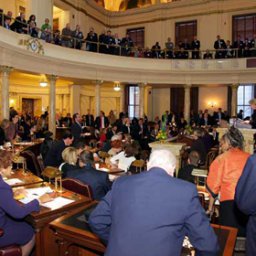
Measure Would Provide Temporary Licenses To Qualified Non-Resident Spouses
TRENTON – In an effort to support military families and ease their transition into New Jersey, Senators Jim Beach and Linda R. Greenstein have sponsored legislation that would permit non-resident military spouses to lawfully practice their profession under a temporary courtesy license, while they fulfill additional requirements for permanent certification in New Jersey. The Senate today approved the bill.
“Military spouses already have to make sacrifices in order for their husbands and wives to fulfill their military duty,” Senator Beach, D-Camden. “It is our responsibility to ease their relocation, and by granting them temporary licenses we will allow them to get back to their careers as soon as possible.”
The bill, S-2544, would direct several professional and occupational licensing boards in the Division of Consumer Affairs to establish criteria for the issuance of temporary courtesy licenses to spouses of active-duty U.S. armed forces members and who are not New Jersey residents but have transferred to the state in the course of their spouse’s military service. The bill would permit licensure by “endorsement,” defined as approval by a state board to practice a profession granted by another state with similar standards, or “reciprocity,” defined as approval via an interstate agreement which indicates that an applicant has met mutually agreed upon preconditions.
Temporary courtesy licenses would allow applicants to be employed while they fulfill all of the requirements for a permanent license in New Jersey, including examinations or endorsement, applications, and additional fees. These temporary licenses would be valid for a period of one year and may be extended at the discretion of the board for an additional one year following the date of application for the temporary courtesy license. The bill would also provide each board in the Division of Consumer Affairs with expedited rulemaking authority to implement the provisions of this bill as soon as practical.
Under the bill, nonresident military spouses would be eligible for a temporary license if they: currently hold a license to practice a profession or occupation in another state, U.S. territory or the District of Columbia that the board determines has equivalent licensure requirements; were actively practicing the profession in another jurisdiction for at least two of the five years immediately preceding the date of application for the temporary courtesy license; pay for and authorize a criminal record background check; have not committed an act in another jurisdiction that would constitute grounds for denial, suspension, or revocation of a license; have not been disciplined or under investigation for an unresolved complaint; and comply with any other requirements, fees, testing, or training that the board deems to be reasonably necessary for the issuance of the temporary courtesy license.
“Members of our armed forces should be able to do their jobs in the best conditions possible. That means helping their families in the process of relocating to a new state,” said Senator Greenstein, D-Middlesex and Mercer. “Moving to a new home can prove exhausting and stressful. Military spouses should not also worry about sacrificing their professional lives during this process.”
According to the U.S. Department of Defense, 26 percent of military spouses are unemployed and currently seeking work – which is more than three times the national unemployment rate. Additionally, one-third of all military spouses work in a field that requires state licensure, with teaching being the most common occupation for a military spouse.
Recently, First Lady Michelle Obama and Dr. Jill Biden have called upon states to increase spousal license portability for military families. The bill is consistent with legislative efforts being made in other states across the country to make it easier for qualified military spouses to maintain their professional or occupational licenses and pursue employment options as they move from one jurisdiction to another. To date, 23 states have enacted legislation to support military spouse professional license portability.
The bill marks the third piece of legislation sponsored by Senators Beach and Greenstein aimed at improving license portability for military spouses in New Jersey. Measures that would provide temporary nursing licenses and temporary teaching licenses to military spouses have been signed into law.
The bill received unanimous approval by the full Assembly in January, and was adopted by the Senate with a vote of 38-0. It now heads to the Governor’s desk for his signature.


